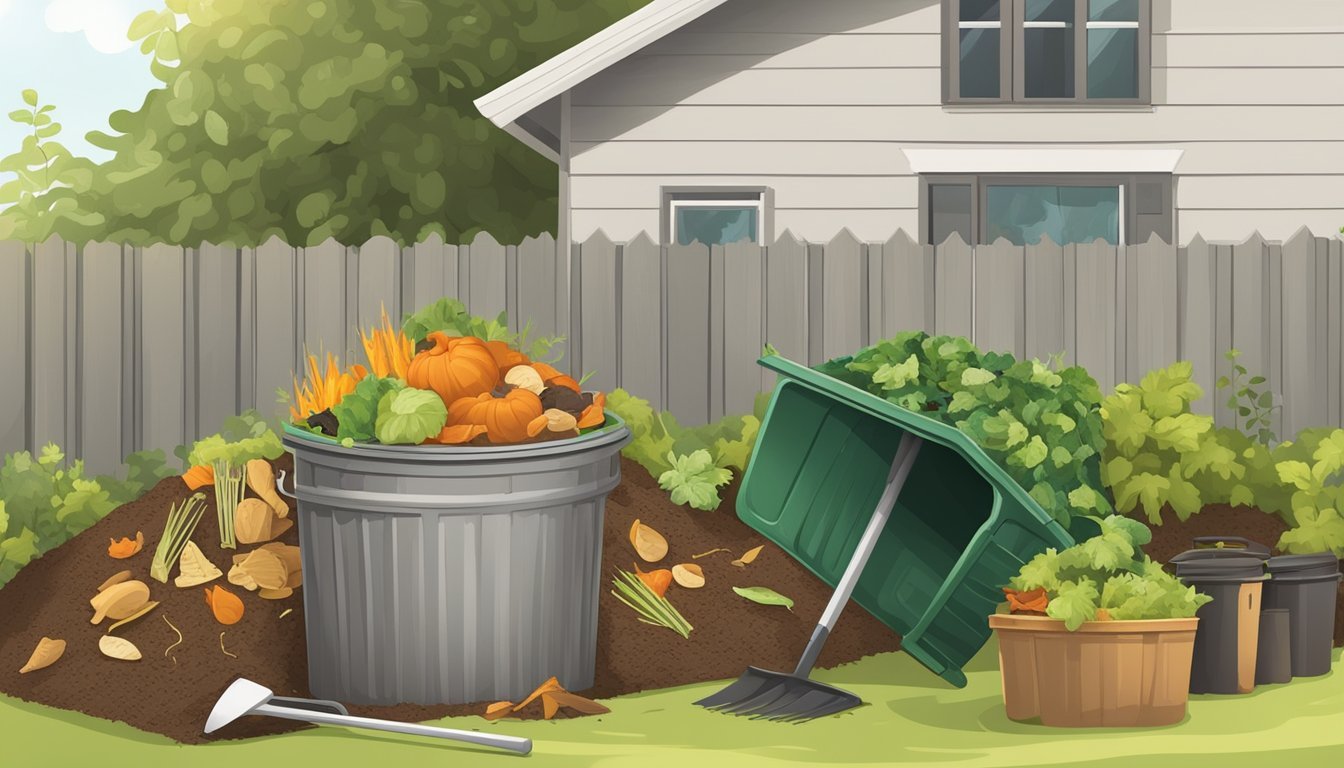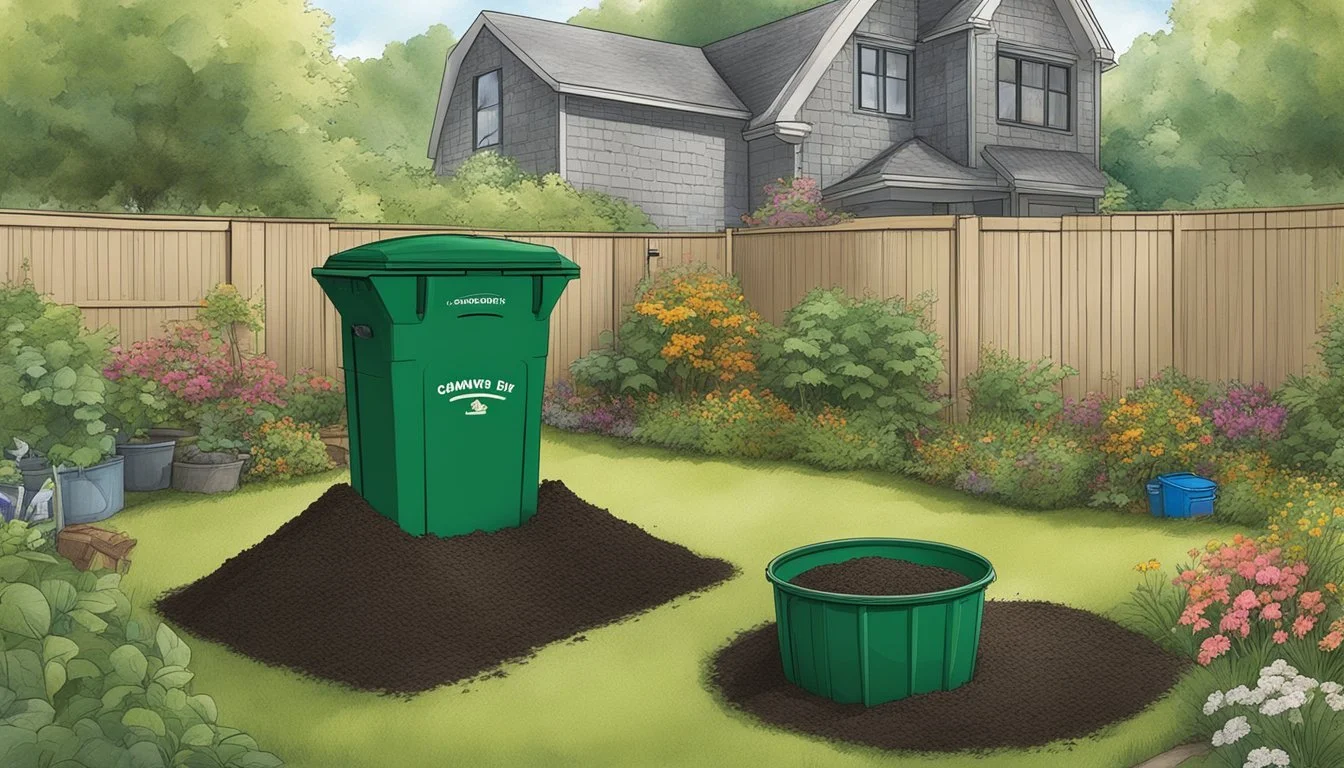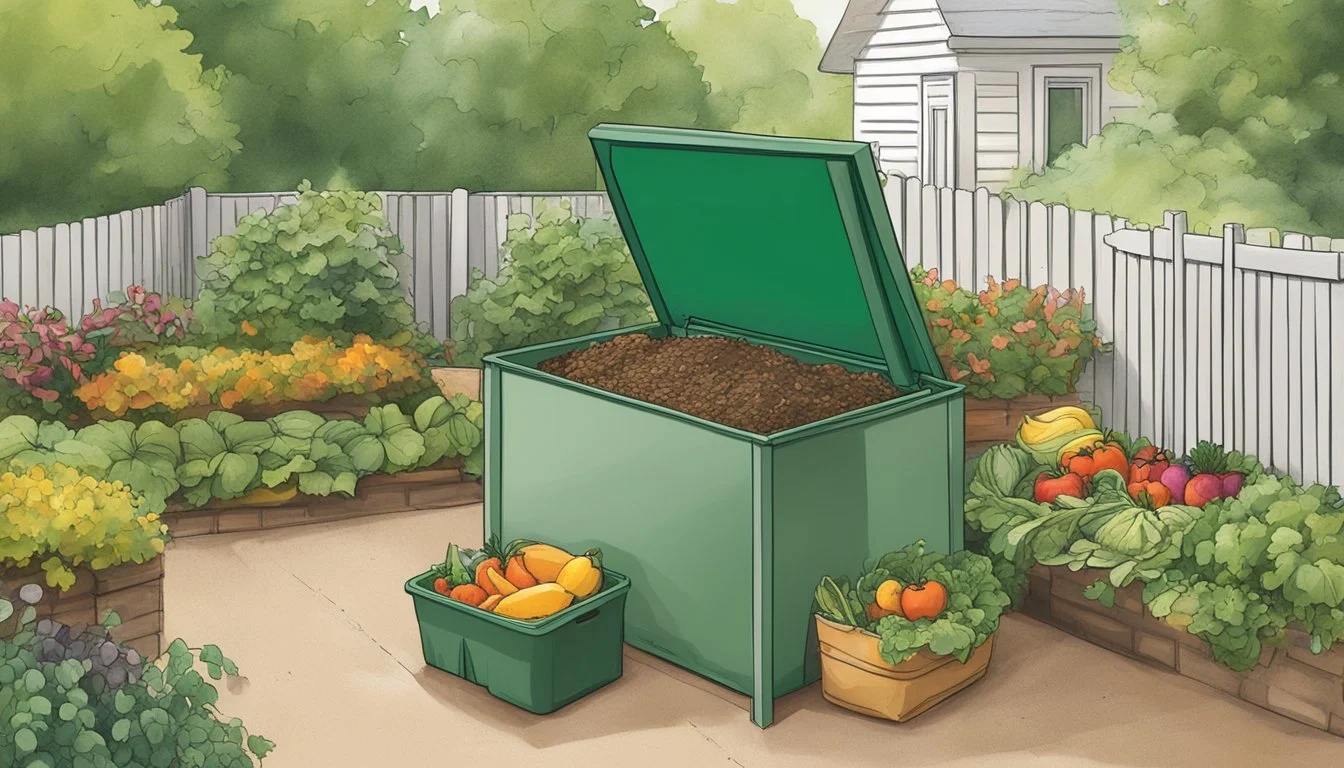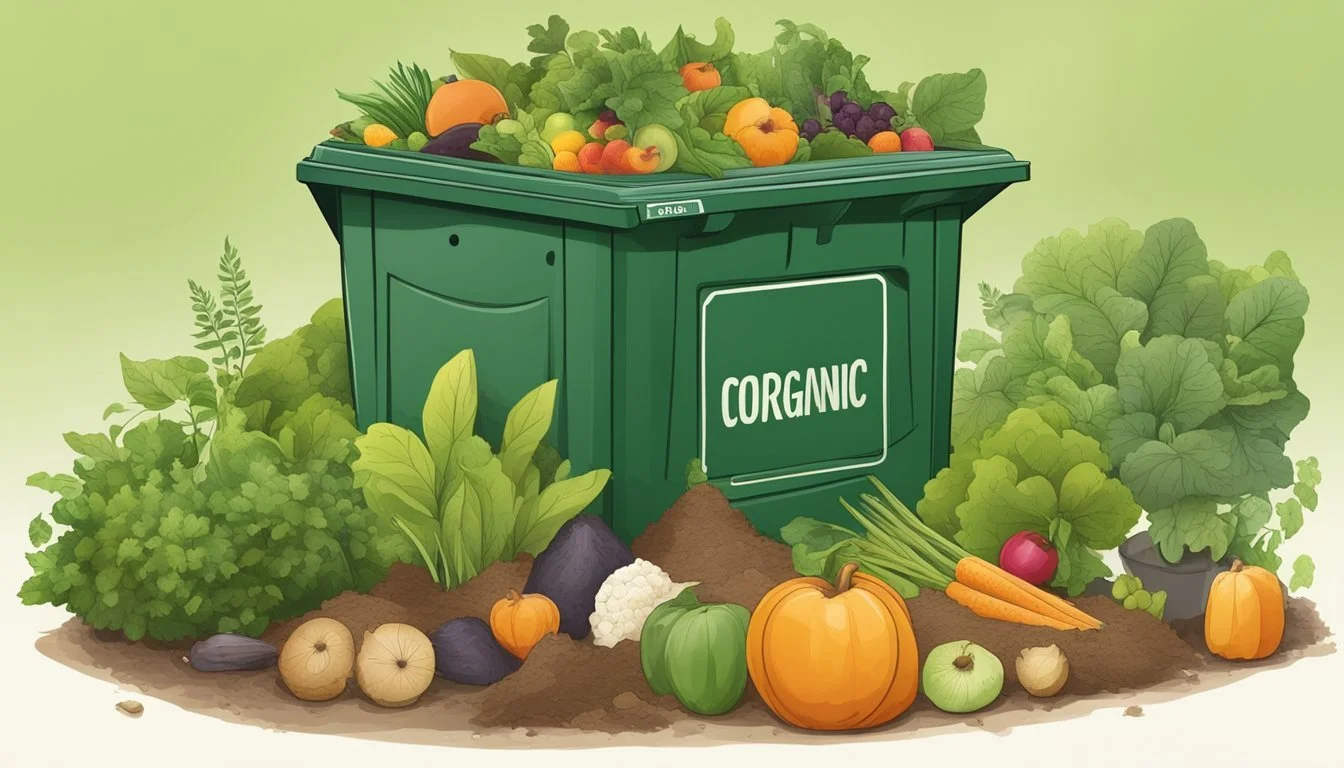Guide to Composting in Green Bay, WI
Essential Tips for Success
Composting offers a sustainable solution for turning yard and kitchen waste into nutrient-rich soil. In Green Bay, Wisconsin, residents and garden enthusiasts can take advantage of the benefits compost brings to both their gardens and the environment. By transforming organic materials like food scraps and leaves into compost, individuals contribute to a greener community while enhancing the quality of their soil. The process of creating compost fosters healthier plant growth and supports local sustainability efforts.
Understanding the basics of composting is essential for anyone looking to get started. It's a straightforward practice that can be tailored to fit different lifestyles, whether by using a purchased compost bin, repurposing an old container, or simply starting a freestanding pile. In Wisconsin, composting even comes with guidance from state resources, ensuring the practice is done effectively without causing a negative impact on the surroundings or local regulations.
For residents in Green Bay, local services such as Greener Bay Compost bring ease to the practice of composting, providing options like residential pickup services and sales of premium compost. Whether through community services or personal endeavors, composting in Green Bay stands as a simple yet impactful way to partake in creating a more sustainable environment.
Understanding Composting
Composting is a transformative process that converts organic matter into a valuable soil amendment, fostering sustainability and reducing greenhouse gas emissions.
What Is Composting?
Composting is the natural process of recycling organic matter, such as leaves, vegetable scraps, and garden debris, into compost, a rich soil amendment. Inside a compost pile, microorganisms break down the materials in the presence of oxygen, turning them into a dark, crumbly substance that enhances soil health.
Benefits of Composting
Environmental Sustainability: By converting waste into compost, organic matter is kept out of landfills, reducing methane—a potent greenhouse gas.
Soil Health: Compost improves soil structure, providing better drainage, increased water retention, and essential nutrients.
Gardening Success: Nutrient-rich compost yields healthier plants, which contributes to a more robust ecosystem.
Composting Essentials
Creating a successful composting setup in Green Bay, Wisconsin, hinges on understanding the proper balance of materials, their composition, and which items to exclude entirely for a healthy composting process.
Key Components of Compost
Compost is a synergy of four main components: organic matter, moisture, oxygen, and thermophilic bacteria. Organic matter consists of both 'brown' and 'green' materials, contributing carbon and nitrogen, respectively. An adequate water supply is essential for the microbial population to thrive, while ample oxygen allows for aerobic decomposition, preventing foul odors.
Brown vs. Green Materials
The balance of brown and green materials is critical in composting:
Brown materials provide carbon, which includes dry leaves, straw, and wood chips. These ingredients are not only carbon-rich but also allow for aeration in the pile.
Green materials supply nitrogen, like food scraps, grass clippings, and coffee grounds. They accelerate the decomposition process, providing proteins and amino acids necessary for the microorganisms.
A general guideline is to maintain a ratio of about 3:1 of brown to green materials for optimal composting conditions.
Composting Materials to Avoid
Not everything can go into your compost pile. To maintain a healthy and odor-free compost system, avoid these:
Oils and dairy products, which can attract pests and create an unpleasant smell.
Diseased plants or invasive weeds, as they might not be broken down entirely and could spread when the compost is used.
Meat or fish scraps, to prevent attracting animals and unwanted bacteria.
Remember, the right mix of materials, paired with consistent maintenance, ensures your compost will transform into the rich, organic matter perfect for enriching the soil.
Setting Up Your Composting Site
When embarking on home composting in Green Bay, selecting the right location and container for your compost site is pivotal. By focusing on these key aspects, you ensure a functional and efficient composting process.
Choosing a Location
For a backyard composting setup, the location should be both convenient and appropriate for processing organic waste. It is vital to choose a dry, well-drained space that receives partial sunlight. This balance in environmental conditions aids in maintaining active decomposition and preventing over-saturation of the compost pile. An ideal spot is one that's easily accessible year-round, allowing for regular maintenance and addition of compostable material.
Building or Choosing a Composting Container
One has two main routes: purchasing a pre-made composting container or building one. Pre-made containers are available for purchase and can be highly efficient, designed with features such as proper aeration holes and easy-to-manage lids.
To construct a DIY container, materials such as wire mesh or repurposed wooden pallets are commonly used.
For example, a simple structure can be fashioned from wire mesh secured with poles.
Wooden chests or old trash cans are alternative, low-cost options.
Outside of personal spaces, Green Bay residents can also utilize local composting facilities, which might be advantageous for those lacking adequate space for a compost pile at home. Whether at home or within a community facility, the choice of container should reflect the user's needs for capacity, space, and ease of handling.
Composting Process
The composting process in Green Bay turns organic waste into a valuable soil amendment through carefully managed stages, ensuring the right balance of moisture, air, and microbial activity.
Stages of Composting
Composting has several key stages. Initially, organic matter is broken down by mesophilic microorganisms, generating some heat. As temperatures rise, thermophilic bacteria take over, further decomposing the materials and sanitizing the pile. The pile eventually cools down, allowing mesophilic bacteria to return and complete the process, maturing the compost over time.
Maintaining the Compost Pile
Maintenance is crucial for a successful composting process. Regularly turning the pile introduces air, which is essential for aerobic bacteria to thrive. Moisture levels should be monitored and maintained akin to a wrung-out sponge, ensuring an optimal environment. As time passes, the pile will also generate heat, indicating that microbial activity is at its peak. This balance of elements facilitates the transformation of organic waste into rich compost at a compost facility or in a home garden.
Using Your Compost
Once your compost reaches maturity, it becomes a powerhouse of nutrients, ready to invigorate your garden. This section outlines the signs of compost readiness and the best practices for applying compost to optimize plant growth.
When Is the Compost Ready?
Compost is ready to use when it is dark, crumbly, and earthy-smelling. This rich substance, often referred to as black gold, should exhibit no remnants of the original organic materials, indicating that decomposition is complete. The compost should feel like a moist, but not wet, spongy material:
Color: Dark brown to black
Texture: Crumbly and loose
Smell: Earthy, not putrid
Moisture: Comparable to a wrung-out sponge
Temperature: Cool, not warm or hot
Applying Compost to Your Garden
For applying compost to your garden, it should be thought of as a supplement to the soil, providing essential nutrients and improving soil structure. Distribute a layer of compost about 2 to 4 inches thick over the garden beds. Recommendation varies depending on whether it is incorporated into the existing soil or used as a top dressing:
Incorporation into soil: Mix compost into the top 6 to 8 inches of your garden bed to improve soil composition and nutrient content.
Top dressing: Spread compost on the surface around plants to act as a slow-release fertilizer, providing essential nutrients such as nitrogen, phosphorus, and potassium.
Compost can also be used to make potting soil for container gardens or as a natural mulch to reduce weeds and retain soil moisture. Regular use of compost can result in robust plant growth and an abundance of fruit and vegetables in one's garden, as the added organic matter nurtures the plants' root systems.
Composting in Green Bay, WI
In Green Bay, WI, residents and businesses have a growing interest in sustainability, and composting plays a crucial role in this environmental effort. The city offers a variety of resources and services to facilitate composting practices, tailoring to both individual and commercial needs.
Local Regulations and Resources
In Wisconsin, the disposal of yard materials in landfills is prohibited, which underscores the state's commitment to composting and recycling. Green Bay residents should first consult with their local municipality to understand the specific guidelines that apply to their area. The Brown County Resource Recovery provides information on how to compost effectively in one's own backyard, as well as regulations to be mindful of. Materials considered compostable include leaves, grass clippings, brush, and branches less than 6 inches in diameter.
Green Bay’s commitment to sustainability is further supported by services such as Greener Bay Compost, which specializes in food-waste-focused compost facilities and offers both residential and commercial compost pickup services. This service ensures that compostable materials are responsibly processed, turning them into premium compost for use in gardens and landscaping.
Community Composting Initiatives
The community in Green Bay takes an active role in composting through various initiatives. One outstanding example is the partnership between local organizations and Greener Bay Compost, which works to collect organic waste, such as leftover food from households and businesses. By doing so, Green Bay reduces the amount of waste sent to landfills and works toward a more sustainable future.
These initiatives not only support Green Bay's local agriculture by providing premium compost but also educate the community on the importance of responsible waste management. Green Bay's tailored approach, including the support for a town of Lessor and the broader city of Green Bay, highlights its dedication to nurturing an environmentally conscious community through collective efforts in composting.
Troubleshooting Common Composting Issues
In Green Bay, composting can occasionally face challenges such as unwanted odors and pests or issues with moisture and temperature. By understanding how to manage these issues effectively, one can maintain a healthy composting process.
Managing Pests and Odors
To deter pests and control odors in a compost pile, it's important to maintain a balanced mix of green and brown material. Green Bay Botanical Garden provides insight into easy composting starts and how to avoid odors by balancing materials correctly. An excess of green materials, like food scraps, can lead to smelly compost. To combat this, add more brown materials, such as leaves or shredded paper, to absorb excess moisture and reduce smells. Enclosing the compost in a bin with a lid can prevent pests and can be made from a trash can or wooden chest. Additionally, turning the pile regularly ensures adequate aeration, discouraging methane buildup and reducing the attraction for rodents and flies.
Ensure a balance: equal parts of green and brown materials
Turn regularly: to oxygenate and prevent methane production
Enclose the bin: using a container with a lid to deter pests
Correcting Moisture and Temperature Problems
Moisture and temperature control are crucial for successful composting. Composting materials may not break down quickly enough if the pile is too wet or the temperature is not optimal. Should the compost become waterlogged, introduce more dry browns to absorb excess moisture. In contrast, if the compost is too dry, adding green materials or water can help. For an effective composting process during colder months in Green Bay, maintaining the correct temperature is essential to facilitate decomposition. One can insulate the compost by adding straw or cardboard to retain heat, suggested by Rural Sprout's guidance on maintaining temperature levels.
Adjust wetness: add browns for excess moisture or greens for dryness
Insulate for warmth: use straw or cardboard to maintain decomposition in cold weather
Composting Beyond the Backyard
While backyard composting is a common practice for homeowners, composting opportunities extend to those without yard space and to larger institutions in Green Bay. Innovative solutions and community projects make it possible for apartment dwellers and organizations to reduce waste and contribute to soil health.
Composting for Apartment Dwellers
For residents of apartments who lack the space for traditional composting setups, vermicomposting—a method using worms to decompose organic waste—can be an excellent alternative. Compact worm bins fit easily under a sink or in a closet, turning kitchen scraps into nutrient-rich compost. They can also explore community composting programs, such as the Northeast Wisconsin Technical College initiative, which engages residents in composting by providing drop-off locations for organic waste. This allows apartment dwellers to contribute to composting efforts without having to manage their own composting systems.
Involving Schools and Businesses
Schools and businesses in Green Bay have the opportunity to make a significant impact on waste reduction through composting. They can start their own composting programs, integrating green waste from landscaping and cafeteria scraps. By collaborating with local experts and organizations like the Wisconsin Department of Natural Resources, these entities can ensure proper setup and maintenance of composting operations. Not only does this practice reduce the amount of waste sent to landfills, but they can also use the resulting compost for maintaining healthy lawns and gardens on their properties. Educational programs can incorporate composting for teaching sustainability practices. Partnerships with media outlets like NPR offer potential for wider community outreach and engagement in composting projects.
Eco-Friendly Waste Management
Eco-friendly waste management in Green Bay, WI focuses on reducing the reliance on local landfills and enhancing recycling and composting efforts. It addresses the city's waste dilemma by diverting trash from landfills to more sustainable processes.
Reduction of Waste Sent to Landfills
By composting organic waste such as food scraps, yard waste, leaves, and coffee grounds, Green Bay residents can significantly decrease the amount of trash sent to local landfills. Incorporating materials like grass clippings and leaves into compost provides a dual benefit: reducing waste volume and producing nutrient-rich mulch for gardening and landscaping. Municipalities encourage residents to divert organic waste from landfilling, supporting the earth's natural process of regeneration.
Examples of compostable organic waste in Green Bay:
Yard materials
Coffee grounds
Cardboard (non-coated)
Composting vs. Recycling
Composting and recycling are complementary practices in waste management. While composting returns nutrients back to the soil, recycling converts materials like newspaper and non-coated cardboard into new products, thereby saving energy and raw materials. Both processes are encouraged by the municipality to reduce the environmental impact of waste.
Key distinctions between composting and recycling:
Composting: a natural process that turns organic waste into valuable mulch.
Recycling: reprocessing materials like paper and cardboard into new items.
Both strategies are essential for creating an eco-friendly waste management system in Green Bay.










